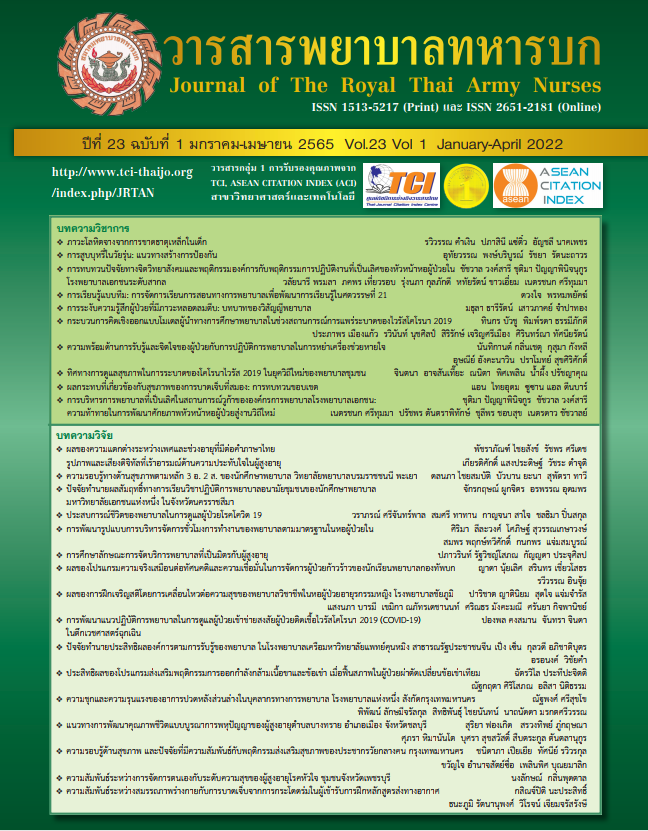Enhancing Older Adults’ Health Promotion Activities by using Community-Based Participation
Keywords:
Older adults, Health promotion activities, Community-based participationAbstract
Older adults’ health promotion behaviors are most important challenge concern for many societies. The studying purpose was to investigate health promotion activities of older adults by using community-based participation. The Ottawa Charter for health promotion was used as a studying framework. Sixty-six older adults from communities in central Thailand were randomly allocated to the study. The 13-item questionnaire was administered to assess demographic data. Open-ended questions were used to assess the opinion of participants about the situations and participating in health promotion. Data from participation observations and focus groups were analyzed using the content analysis.
The findings were organized by three main themes in enhaceing health promotion activiies, namely pursuing comprehensive planning, promoting community engagement and prioritizing the older adults’ needs. Thease activities were performed through health constitution, promoting built environment modification, enhancing personal skills, and reorientation of health services by responding the needs of older adults are the main success of health promotion. The community empowerment by fostering the community ownership, social support and participation are essential requirements for sustainable health promotion behavior change. This studying had unexpected benefits, including more integrated community engagement, increased knowledge, greater awareness and understanding of the importance of health promotion participation among older adults. Findings provide data-based for community nurses to develop interventions to improve community participation in changing health-promoting behaviors.
Downloads
References
Suraphak S. Development of the community participation in health promotion model for elderly at Chuen Chom district, Maha Sarakham province. Acad. J. Mahasarakham Prov. Public. Health Off. 2017; 1(1): 29-37. (in Thai)
Department of Older Persons, Ministry of Social Development and Human Security. Elderly statistics in 2020. Bangkok: Department of Older Persons; 2563. (in Thai)
The National Committee on the Elderly the National Committee on the Elderly, Ministry of Social Development and Human Security. The 2nd national plan on the elderly (2002 -2021). Bangkok: Thepphenvanish; 2010. (in Thai)
Duplaga M, Grysztar M, Rodzinka M, Kopec A. Scoping review of health promotion and disease prevention interventions addressed to elderly people. BMC Health Serv. Res. 2016; 16 (5): 455 -79.
Bammann K, Recke C, Albrecht BM, Stalling I, Doerwald F. Promoting physical activity among alder adults using communitybased participatory research with an adapted PRECEDE-PROCEED model approach: the AEQUIPA/OUTDOOR active project. Am J Health Promot. 2021; 35(3): 409-20.
Khoenpetch P, Wongjai L. The effectiveness of the community participation to change behavior causing belly fat among the elders by the health service network in Mae Lao district. Chiangrai Med J. 2016; 7(1): 103-12. (in Thai)
Su A, Gerald CHK, Chuen ST, Mee LW, Hubertus JMV, Susana CH, Mary ABG, Zoe JLH. Promoting biopsychosocial health of older adults using a community for successful ageing program (ComSA) in Singapore: a mixed-methods evaluation. Soc. Sci. Med. 2020; 258: 1-11.
Wongwiseskul S, Sukcharoen P, Payomyong S. Community participation model of health promotion for the elderly in Bangphlat district, Bangkok metropolis. SDU Res. J. 2017;10 (2): 153-73. (in Thai)
Hikichi H, Kondo N, Kondo K, Aida J, Takeda T, Kawachi I. Effect of a community intervention programme promoting social interactions on functional disability prevention for older adults: propensity score matching and instrumental variable analyses, JAGES Taketoyo study. J Epidemiol Community Health 2015; 69: 905-10.
World Health Organization. Milestones in health promotion: statements from global conferences. Geneva: World Health Organization; 2009.
Department of Family Clinical Practice and Community. Chronic illness statistic. Suphanburi: Department of Family Clinical Practice and Community; 2020. (in Thai)
Marshall C. Rossman G. Designing qualitative research. 6thEd. Thousand Oaks: Sage Publications; 2016.
Brand T, Gansefort D, Rothgang H, Röseler S, Meyer J, Zeeb H. Promoting community readiness for physical activity among older adults in Germany-protocol of the ready to change intervention trial. BMC Public Health. 2016; 16(1): 1-6.
Ellis G, Hunter RF, Hino AAF, Cleland CL, Ferguson S, Murtagh B, et al. Study protocol healthy urban living and ageing in place (HULAP): an international, mixed methods study examining the associations between physical activity, built and social environments for older adults the UK and Brazil. BMC Public Health. 2018; 18(1): 1135-45.
Lima KC, Caldas CP, Veras RP, Correa RF, Bonfada D, de Souza DLB, et al. Health promotion and education: a study of the effectiveness of programs focusing on the aging process. Int J Health Serv. 2017; 47(3): 550–70.
Maximova K, Hanusaik N, Kishchuk N, O’Loughlin JL. Public health strategies promoting physical activity and healthy eating in Canada: are we changing paradigms?. Int J Public Health 2016; 61: 565–72.
Richards EA, Cai Y, Integrative review of nurse-delivered community-based physical activity promotion. Appl Nurs Res. 2016; 31: 132-8.
McMahon SK, Lewis BA, Guan W, Wyman JF, Rothman AJ. Community-based intervention effects on older adults’physical activity and falls: protocol and rationale for a randomized optimization trial (Ready Steady 3.0). Contemp Clin Trials. 2021; 101: 106-238.
Simons M, Reijnders J, Peeters S, Janssens M, Lataster J, Jacobs N. Social network sites as a means to support personal social capital and well-being in older age: an association study. Comput Human Behav. 2021; 3: 1-8.
Phopa Y, Sanveingchan S, Pruksacheva T. Factors effecting health promotion behavior in elderly: in-depth factors study in Ban Khlong Yong Moo. Journal of The Royal Thai Army Nurses. 2017; 18(Supplement): 266-75. (in Thai)
Downloads
Published
How to Cite
Issue
Section
License
Copyright (c) 2022 Journal of The Royal Thai Army Nurses

This work is licensed under a Creative Commons Attribution-NonCommercial-NoDerivatives 4.0 International License.
บทความหรือข้อคิดเห็นใดใดที่ปรากฏในวารสารพยาบาลทหารบกเป็นวรรณกรรมของผู้เขียน ซึ่งบรรณาธิการหรือสมาคมพยาบาลทหารบก ไม่จำเป็นต้องเห็นด้วย
บทความที่ได้รับการตีพิมพ์เป็นลิขสิทธิ์ของวารสารพยาบาลทหารบก
The ideas and opinions expressed in the Journal of The Royal Thai Army Nurses are those of the authors and not necessarily those
of the editor or Royal Thai Army Nurses Association.






